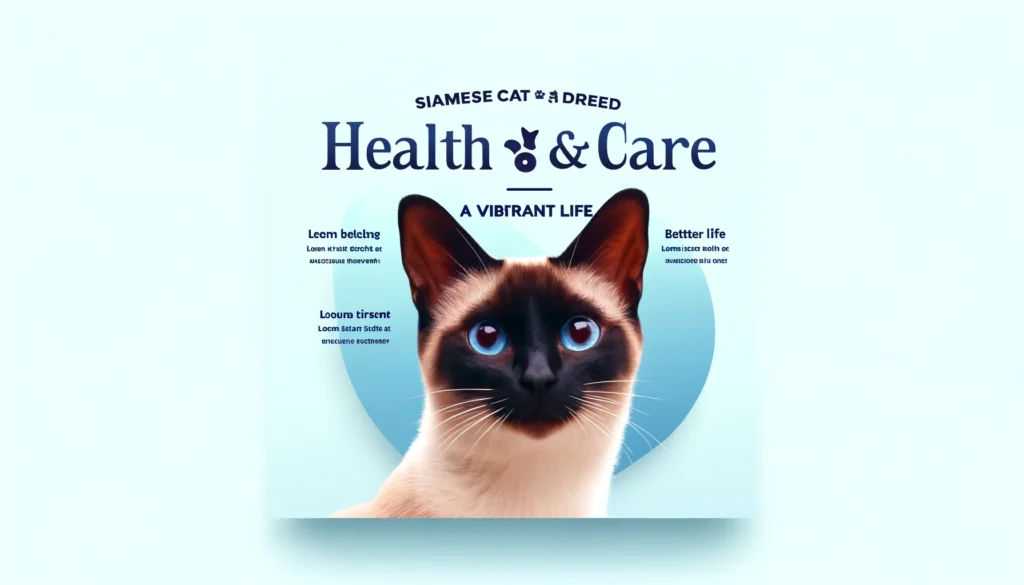Siamese Cat Breed Health and Better Care: a Vibrant Life

Siamese cats, known for their striking blue eyes and unique color points, are one of the most cherished cat breeds worldwide. Whether you’re intrigued by the hypoallergenic nature of Siamese cats or their distinct personality, understanding the health, diet, grooming, and overall care practices essential for a Simease cat is crucial for their well-being. Let’s delve into the world of Siamese cat care, touching upon everything from the typical Siamese cat price to their hypoallergenic traits.

Understanding Your Siamese Cat
Siamese Cat Traits and Personality
A Siamese’s personality is as vibrant as its coloration. Known for their vocal nature and affectionate demeanor, Siamese are not just pets; they are part of the family. They crave interaction and will often follow their owners around, contributing loudly to every conversation. Not just a pretty face, the Siamese’s personality is a key reason why they are so beloved.
Health Overview of Siamese Cats
Common Health Concerns in Siamese Cats
While Siamese cats are generally healthy, they are prone to certain conditions such as respiratory issues, dental problems, and more unique concerns like Progressive Retinal Atrophy (PRA) and Amyloidosis. Knowledge of these common issues can prepare Siamese cat owners for potential health challenges.
- Respiratory Issues: This can be a concern for Siamese cats, given their distinct facial structure.
- Dental Health: Siamese cats require regular dental check-ups and cleanings to prevent periodontal disease.
- Progressive Retinal Atrophy: An inherited condition in some Siamese cats, leading to potential blindness.
- Amyloidosis: A condition affecting the liver, prevalent in some Siamese cats.
Diet and Nutrition
Feeding Your Siamese Cat
The diet of a Siamese cat should be carefully managed to prevent obesity, which Siamese cats are prone to due to their sociable nature and potential for overeating. High-quality cat food, tailored to their age and health needs, is paramount. Whether you’re feeding a fluffy Siamese cat or a traditional short-haired one, ensure their food supports a healthy coat and skin.
- Protein-rich Diet: Siamese cats benefit from a diet high in protein to support their energetic lifestyle.
- Hydration: Wet food can help supplement their hydration, especially important for managing the risk of kidney problems.
Grooming and Maintenance
Caring for Your Siamese Cat’s Coat and Claws
Regular grooming is not only a necessity but also a great way to bond with your Siamese cat. They typically have short, fine coats that require minimal grooming. However, regular brushing can help reduce shedding and keep their coat glossy.
- Bathing: Siamese cats rarely require baths, but an occasional bath can help keep their coat in optimal condition, especially for long-haired Siamese cats.
- Nail Care: Regular nail trimming should be part of their care routine to avoid overgrowth and splitting.
Do you know?
You can enjoy a lush, green space with colorful flowers and healthy plants without risking your cat’s well-being. Choosing non-toxic options like basil, spider plants, and orchids lets you bring nature indoors safely.
Behavioral Traits and Environmental Enrichment
Keeping Your Siamese Cat Happy
Siamese cats are active and playful, and they require mental stimulation to stay healthy and happy. Toys, puzzles, and regular playtime are essential.
- Interactive Toys: Engage their hunting instincts and prevent boredom.
- Climbing Structures: A cat tree or climbing shelves can help satisfy their climbing instincts.
Regular Veterinary Visits
Health Checks and Preventative Care
Routine veterinary check-ups are crucial to catch and address health issues early. Siamese cats should be monitored for the specific health risks associated with their breed, and preventive care, including vaccinations and parasite control, is vital.
Siamese Cat Lifespan and Long-term Health
Maximizing Your Siamese Cat’s Health Span
With proper care, Siamese cats can live long and healthy lives, often reaching into their late teens or early twenties. Understanding and preparing for common health issues can help you provide the best care for your long-haired or traditional Siamese cat.
Conclusion: Thriving With Your Siamese Cat
Siamese make wonderful, engaging companions when their specific needs are met. By understanding the Siamese health needs, providing a balanced diet, and ensuring they have plenty of enrichment, your Siamese will lead a happy, healthy life. Whether you’re contemplating the cost of a Siamese or exploring the best diet for their hypoallergenic needs, thorough care can ensure your Siamese thrives in your loving home.
Is Siamese an indoor cat?
Yes, Siamese are well-suited for indoor living. Their sociable and affectionate nature makes them thrive in a home environment where they can interact regularly with their human companions. Keeping Siamese indoors also helps protect them from outdoor dangers such as traffic, predators, and diseases. Additionally, indoor environments can provide the mental and physical stimulation they need through toys, climbing structures, and interactive play, ensuring they remain happy and healthy.
Do Siamese cats like water?
Many Siamese exhibit a fascination with water, which is somewhat unusual among cat breeds. They may enjoy playing with water in their bowls, chasing dripping taps, or even partaking in supervised water activities like playing in a shallow basin. This affinity for water can be attributed to their curious and intelligent nature. However, individual preferences can vary, so while some Siamese may relish water-related activities, others might be indifferent.
What is the best food for Siamese cats?
The best food for Siamese is a high-quality, balanced diet that caters to their specific nutritional needs. Opt for premium commercial cat foods that list meat as the primary ingredient and are rich in protein. Foods formulated for active and intelligent breeds can be particularly beneficial. Additionally, incorporating wet food can help maintain proper hydration. It’s essential to choose foods free from artificial additives and fillers, and consulting with a veterinarian can help tailor a diet plan that supports their overall health and well-being.
Are Siamese cats high maintenance?
Siamese can be considered moderately high maintenance due to their active, social, and intelligent nature. They require regular mental and physical stimulation to prevent boredom and potential behavioral issues. This includes interactive playtime, puzzle toys, and opportunities to explore their environment. Additionally, their vocal tendencies mean they seek regular interaction and attention from their owners. Regular grooming is generally minimal, but consistent engagement is necessary to keep them happy and well-adjusted.
Do Siamese cats have health issues?
Siamese are generally healthy, but like all breeds, they are predisposed to certain health issues. Common concerns include respiratory problems such as asthma, dental disease, and eye conditions like progressive retinal atrophy (PRA) and cataracts. They may also be prone to certain heart conditions, such as hypertrophic cardiomyopathy (HCM). Regular veterinary check-ups, a balanced diet, and a healthy lifestyle can help manage and mitigate these potential health issues, ensuring a long and healthy life for your Siamese.
Are Siamese cats hard to care for?
Siamese require a level of care that reflects their active and social personalities. While they are not necessarily hard to care for, they do need consistent interaction, mental stimulation, and physical activity to remain content. Their vocal nature means they seek attention and may not appreciate prolonged periods of neglect. Regular playtime, engagement with their environment, and a stable routine can make caring for a Siamese manageable and rewarding for owners who are committed to meeting their needs.
What is the most common cause of death in Siamese cats?
The most common causes of death in Siamese, as with many domestic cat breeds, typically include chronic diseases such as kidney disease, cancer, and heart disease. Progressive retinal atrophy (PRA) and other genetic conditions can also contribute to mortality rates. Additionally, accidents and trauma can be significant factors, especially if the cat has outdoor access. Maintaining regular veterinary check-ups and a healthy lifestyle can help in early detection and management of these health issues, potentially extending the lifespan of a Siamese.
What is a Siamese cat’s favorite treat?
Siamese cats often enjoy treats that are high in protein and have strong flavors, such as small pieces of cooked chicken, turkey, or fish. Commercial cat treats specifically designed for high-protein needs are also popular. Additionally, many Siamese are intrigued by interactive treats like puzzle feeders or treats that can be hidden in toys, catering to their intelligent and playful nature. It’s important to offer treats in moderation to maintain a balanced diet and prevent obesity.
Do Siamese cats need a bath?
Siamese generally do not require frequent baths, as they are naturally clean and groom themselves diligently. However, occasional bathing may be necessary if they become particularly dirty or develop skin issues. When bathing a Siamese , use a mild, cat-friendly shampoo and ensure thorough drying to prevent any skin irritation. Regular brushing can help maintain their coat and reduce the need for baths, while also providing an opportunity for bonding and checking for any health concerns.
What do Siamese cats love the most?
Siamese love companionship and interaction with their human family members. They thrive on attention, affection, and active engagement, enjoying activities like interactive play, training sessions, and being involved in daily routines. Their intelligent and curious nature means they also appreciate mental stimulation through puzzle toys, climbing structures, and exploring new environments. Additionally, many Siamese enjoy lounging in sunny spots or cozying up in their favorite resting places, blending their playful and affectionate traits.
How many times a day should I feed my Siamese cat?
Siamese should typically be fed two to three times a day, depending on their age, activity level, and specific dietary needs. Kittens may require more frequent feeding, while adult cats can often be managed with two meals per day. It’s important to provide a consistent feeding schedule and monitor their weight and health to adjust portions as necessary. Additionally, ensuring access to fresh water at all times is crucial for their overall well-being.
What are Siamese cats allergic to?
Siamese can be allergic to a variety of substances, similar to humans. Common allergens include certain foods, such as specific proteins (e.g., beef, dairy, fish), environmental factors like pollen, dust mites, and mold, as well as chemicals found in cleaning products or certain cat grooming products. Symptoms of allergies in Siamese may include itching, sneezing, excessive grooming, and digestive issues. Identifying and eliminating the allergen, often with the help of a veterinarian, is essential for managing their allergies effectively.
What can Siamese cats not eat?
Siamese should avoid certain foods that can be toxic or harmful to them. These include chocolate, caffeine, alcohol, onions, garlic, grapes, raisins, and certain artificial sweeteners like xylitol. Additionally, raw eggs, raw fish, and bones can pose health risks. It’s important to avoid feeding them foods high in fat, salt, or artificial additives, and to be cautious with dairy products, as many cats are lactose intolerant. Always consult with a veterinarian before introducing new foods into your Siamese diet to ensure their safety.
What disease is common in Siamese?
One common disease in Siamese is Progressive Retinal Atrophy (PRA), a genetic condition that leads to the gradual deterioration of the retina, resulting in vision loss and eventual blindness. Additionally, Siamese are predisposed to respiratory issues such as asthma and have a higher incidence of certain heart conditions like hypertrophic cardiomyopathy (HCM). Dental disease and kidney problems are also more prevalent in this breed. Regular veterinary check-ups and genetic testing can help in early detection and management of these conditions.
Is a Siamese cat expensive?
Siamese can be relatively expensive compared to some other breeds. The initial cost of purchasing a Siamese kitten from a reputable breeder can range from several hundred to a few thousand dollars, depending on factors like lineage, color points, and breeder reputation. Additionally, ongoing costs such as high-quality food, veterinary care, grooming supplies, and other necessities can add to the overall expense of owning a Siamese . However, many owners find the companionship, intelligence, and affectionate nature of Siamese to be well worth the investment.
Do Siamese cats cry a lot?
Yes, Siamese are known for being very vocal. They frequently meow, yowl, and chirp to communicate their needs and desires. This trait makes them excellent companions for those who enjoy interactive and expressive pets. Providing plenty of attention, mental stimulation, and regular playtime can help manage their vocal tendencies.






